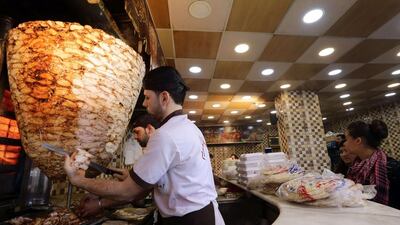DAMASCUS // More than four years into a grinding civil war, the Syrian government is scraping the barrel to boost its revenues with everything from taxes on shawarma sandwiches to telephone lines.
The country’s economy has been ravaged by the conflict that began in March 2011, which has claimed the lives of over 250,000 people and pushed over four million to become refugees.
Perhaps the most tangible evidence is the weakness of the Syrian pound, currently trading at 390 to the US dollar, compared to around 60 before the war and 240 just a year ago.
Most money changers in Damascus expect things to get worse still, anticipating a further slide to 500 pounds to the dollar next year.
When the uprising against president Bashar Al Assad’s regime began, the governor of the central bank announced the country had reserves of some $18 billion.
But experts say much of that has been used up, though it is impossible to know how much remains.
“The regime has less and less foreign currency, revenues have dried up, the war effort is becoming more taxing and its two main donors, Russia and Iran, have their own financial problems,” said Jihad Yazigi, editor-in-chief of The Syria Report, an online economic journal.
Since March 2011, Iran has extended Syria some $5.5 billion in credit lines, but Russia in November last year decided against a one-billion-dollar loan.
Revenues have slowed to a trickle, particularly as the government has come under sanctions that prevent exports and lost control of much of the country’s oil and gas resources.
The oil minister has acknowledged some $58 billion in direct and indirect losses to the oil and gas sector since the war began.
With the ISIL capture of most of Syria’s eastern oilfields, the government now produces just 9,688 barrels a day, down from 380,000 before the war.
Refined output — made up of Syrian and imported oil — has sunk from 112,000 barrels a day in 2014 to just 80,000 barrels, and gas production is down to 12 million cubic metres a day from 27 million five years ago.
The 2016 budget projects a 31 per cent deficit, similar to that of 2015, prompting the government to rein in spending and impose new taxes.
It has instructed all public administrations to reduce their energy consumption by 30 per cent and to eliminate thousands of temporary government employee contracts.
The state telecommunications company, which has a monopoly on landlines, has also doubled monthly subscription fees for its 4.5 million subscribers.
That in theory ought to bring in some 10.8 billion Syrian pounds ($308 million), but The Syria Report noted that the company’s subscriber base has plummeted because up to 40 per cent of its network has been damaged.
Even the humble shawarma sandwich, a popular Middle Eastern dish of grilled, spiced meat cut into thin slices, has not escaped the government’s drive for revenues.
“Last week I had to pay 220 Syrian pounds for my shawarma sandwich instead of 200, and the restaurant owner told me it was because there’s a new 10 per cent ‘reconstruction tax’ that’s being imposed on each sandwich,” 50-year-old Damascus resident Tahseen said.
Property rents also face new taxes of between 500-1,000 Syrian lira a month, and the tourism ministry has began taxing restaurants based on the number of diners they can accommodate.
The measures come after previous steps, including easing subsidies for bread, which increased in price three times in 2014, along with rising costs for water and electricity.
And the government has also sought to squeeze revenue out of issuing and renewing passports, raising fees while lifting some restrictions to bring in around $520 million since the start of the year, according to the interior ministry.
And it has stemmed the outflow of foreign currency, limiting import licenses and giving priority to those seeking raw materials for the production of dairy products, canned foods, medicines, detergents and textiles inside Syria.
But despite the regime’s efforts, Mr Yazigi said “the future is bleak” for Syria’s economy and the government’s finances.
“The state will be forced to slash its spending even further,” he said.
“And since it won’t be able to touch military spending, it will cut public services and not repair what is damaged, and people will become poorer and poorer,” he added.
“They will be forced increasingly to dip into their savings and many will look to emigrate.”
* Agence France-Presse

